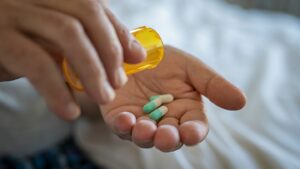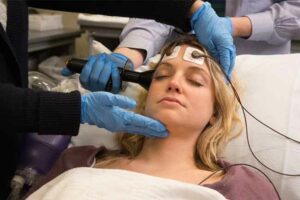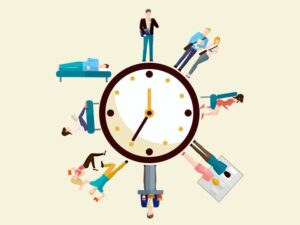Depression is a serious mental illness that millions of people suffer from. It can be difficult to know which treatment is right for you, as there are so many options available. In this blog post, we will discuss the 11 most commonly major depressive disorder treatments for depression and provide information on each one. We hope that this information will help you make an informed decision about which treatment is best for you!
Contents
What Is Major Depressive Disorder?
 Major depressive disorder is a mental health condition that causes persistent feelings of sadness and loss of interest. It affects how you feel, think, and behave and can lead to a variety of emotional and physical problems. You may have trouble doing normal day-to-day activities, and sometimes you may feel as if life isn’t worth living.
Major depressive disorder is a mental health condition that causes persistent feelings of sadness and loss of interest. It affects how you feel, think, and behave and can lead to a variety of emotional and physical problems. You may have trouble doing normal day-to-day activities, and sometimes you may feel as if life isn’t worth living.
Moreover, this condition is different from the ” blues ” that everyone experiences from time to time. With major depressive disorder, these feelings don’t go away and can get worse over time. MDD is basically characterized by:
- low or no motivation,
- feeling “empty”,
- fatigue,
- poor sleep and/or appetite,
- difficulty concentrating.
So, these signs and symptoms of depression can be distressing and disrupt your daily life. It is essential to seek treatment when you experience these symptoms.
Top 11 Major Depressive Disorder Treatments
Major depressive disorder treatments vary depending on the severity of your symptoms. In fact, what works for one person may not work for another. So, it’s important to work with a mental health professional to figure out which treatment is right for you. Here are 11 major depressive disorder treatments to consider:
Psychotherapy
Psychotherapy is also known as talk therapy. It’s a way to treat depression by talking about your condition and related issues with a mental health professional. In this therapy, you can learn about your condition and how to manage your symptoms. Psychotherapy generally includes two types of therapy:
Cognitive-behavioral therapy: This type of therapy helps you identify negative thinking patterns and replace them with more positive ones.
Interpersonal therapy: This type of therapy focuses on your relationships and how they may be affecting your depression.
So, these two therapies are the most commonly used to treat depression.
Medication
 There are many different types of medication that can be used to treat major depressive disorder. The most common type of medication is antidepressants. Antidepressants work by balancing chemicals in your brain. These chemicals are called neurotransmitters, and they affect mood and emotions. There are many different types of antidepressants, some examples are:
There are many different types of medication that can be used to treat major depressive disorder. The most common type of medication is antidepressants. Antidepressants work by balancing chemicals in your brain. These chemicals are called neurotransmitters, and they affect mood and emotions. There are many different types of antidepressants, some examples are:
- selective serotonin reuptake inhibitors (SSRIs),
- serotonin and norepinephrine reuptake inhibitors (SNRIs),
- monoamine oxidase inhibitors (MAOIs).
These medications can have different side effects. Some common side effects are:
- nausea,
- vomiting,
- diarrhea,
- loss of appetite,
- weight gain or weight loss,
- mood swings,
- agitation,
Thus, if you are considering taking medication for your major depressive disorder, it is important to speak with a mental health professional to figure out which type of medication would work best for you and your specific situation.
Transcranial Magnetic Stimulation (TMS)
TMS is a noninvasive procedure that uses magnetic fields to stimulate nerve cells in the brain to improve symptoms of depression. It is typically used when other treatments, such as medication and therapy, haven’t been effective.
TMS is usually done five times a week for four to six weeks. Each session lasts about 40 minutes. It works by delivering magnetic pulses to the region of the brain that’s responsible for mood. TMS is generally well-tolerated. The most common side effect is headaches. Some people also experience:
- dizziness,
- tingling,
- or scalp discomfort during treatment.
Electroconvulsive Therapy (ECT)
 ECT is a procedure that sends electric pulses to the brain to trigger a brief seizure. It’s used to treat severe depression that hasn’t responded to other treatments, such as medication and TMS.
ECT is a procedure that sends electric pulses to the brain to trigger a brief seizure. It’s used to treat severe depression that hasn’t responded to other treatments, such as medication and TMS.
ECT is usually done three times a week for two to four weeks. The procedure is done under general anesthesia, so you won’t be awake during it.
You may be confused and have short-term memory loss when you first wake up after the procedure. But this side effect is usually temporary.
Other possible side effects include:
- headache,
- muscle aches,
- temporary confusion and disorientation.
Overall, this treatment for major depressive disorder can be quite effective.
Herbal Supplements
Herbal treatment is recently becoming a more popular option for people suffering from depression. St. John’s Wort is one of the most commonly used herbal supplements to treat depression. And has been shown to be just as effective as some prescription antidepressants. Other supplements include:
- omega-three fatty acids,
- S-adenosylmethionine (SAMe),
- magnesium,
- probiotics, and
- glycine.
While these supplements have been shown to be effective. It is important to remember that they can take up to a few weeks to start working. And, as with any supplement, it is important to speak with your doctor before starting any new treatment.
Find A Support Group
Another important treatment option for major depressive disorder is finding a support group. This can be an in-person or online group of people who are also dealing with depression. In these groups, you can share your experiences and listen to others talk about theirs. This can be a valuable way to learn about different coping strategies and to feel less alone in your battle with depression.
Finding a support group that’s right for you may take some trial and error. You may have to try out a few different groups before you find one that feels comfortable. But once you do, it can be an invaluable resource in your journey to recovery.
Practice Exercise
 Exercise is a great healthy activity to partake in and has been shown to be an effective treatment for depression. It can help by releasing endorphins, improving sleep quality, and increasing energy levels. Moreover, it has long-term effects by improving self-esteem, body image, and social skills.
Exercise is a great healthy activity to partake in and has been shown to be an effective treatment for depression. It can help by releasing endorphins, improving sleep quality, and increasing energy levels. Moreover, it has long-term effects by improving self-esteem, body image, and social skills.
You can just try starting with a simple walking program. Or, if you’re feeling up to it, join a class or sport that you’re interested in. Only just 30 minutes a day of exercise can make a world of difference.
Acupuncture
This traditional Chinese medicine has been used for centuries to treat a variety of ailments. And recent studies have shown that it can be an effective treatment for depression. Acupuncture works by stimulating certain points in the body. This helps to release chemicals in the brain that can improve mood and overall well-being.
In fact, this option is so effective that the World Health Organization recommends it as a treatment for depression. If you’re interested in trying acupuncture, make sure to find a qualified practitioner in your area.
Self-Relaxation Techniques
Relaxation techniques are considered an important part of treatment for major depressive disorder. Relaxation can help reduce stress, anxiety, and negative thinking. There are many different relaxation techniques that you can try, including:
- Progressive muscle relaxation
- Deep breathing
- Yoga
- Meditation
These techniques work best when they are practiced regularly. You may need to try several different techniques before you find one that works best for you. Moreover, these techniques bring so many benefits to you. And, not just for your mental health but also for your physical well-being.
Create A Routine
 Routine in your treatment option is important to help ease your depression symptoms. A routine can provide a sense of structure and normalcy in your day-to-day life. Which can be helpful when you’re feeling down. In fact, the routine can be a major depressive disorder treatment in and of itself.
Routine in your treatment option is important to help ease your depression symptoms. A routine can provide a sense of structure and normalcy in your day-to-day life. Which can be helpful when you’re feeling down. In fact, the routine can be a major depressive disorder treatment in and of itself.
That said, it’s important to find a routine that works for you. If you hate running, don’t make it part of your morning ritual just because you think you should. Instead, do something that makes you happy. There are numerous activities that can help ease depression symptoms, so find one that you enjoy and stick with it.
If you’re not sure where to start, consider these activities:
- Take a walk in nature
- Read a book
- Write in a journal
- Cook healthy meals
- Listen to music
These things can help you feel more connected to the world around you and give you a sense of purpose. And, they can be done at your own pace, which is important when you’re dealing with depression.
Set Realistic Goals
In life, it is often easy to get bogged down by day-to-day tasks and forget about the bigger picture. When you have a major depressive disorder, it is important to set realistic goals for yourself so that you can stay on track and motivated.
One way to do this is to break your goals down into small, manageable pieces. For instance, rather than setting a goal to “lose weight,” set a goal to “lose five pounds.” This way, you can better focus on the task at hand and not get overwhelmed by the larger goal.
So, these are the top 11 ways through which you can treat your major depressive disorder. But always remember that it is important to talk to your doctor before starting any new treatment. They will be able to help you figure out which one is right for you.
How To Find The Right Treatment For You?
There are several major depressive disorder treatments available and finding the right one can be a daunting task. The best way to find the most effective treatment is to work with a mental health professional. They can help you to get an accurate diagnosis and create a comprehensive treatment plan.
However, here are some of the tips to get you started on finding the right treatment:
Talk to your doctor
This is one of the most important steps in getting treatment is to talk to your doctor. They can help you to understand your options and make a decision about which treatment is right for you. In fact, your doctor may be able to prescribe medication that can help to treat your depression. So, discussing with your doctor is a key step in getting treatment.
Research your options
There are a variety of treatment options available and it is important to do your research to find the one that is right for you. You can talk to your doctor, read books or articles, or even look online for information. Once you have an idea of the different options, you can start to narrow down your choices. Doing your own research is a great way to make sure that you are getting the best treatment possible.
Create a support system
 A support system is a key part of any treatment plan. This can include family, friends, or even a support group. Having people to talk to who understand what you are going through can be a huge help. If you do not have a support system, there are many resources available to help you get one. It is also believed that by having a support system, you are more likely to stick to your treatment plan.
A support system is a key part of any treatment plan. This can include family, friends, or even a support group. Having people to talk to who understand what you are going through can be a huge help. If you do not have a support system, there are many resources available to help you get one. It is also believed that by having a support system, you are more likely to stick to your treatment plan.
Ask questions
When you are talking to your doctor or mental health professional, be sure to ask questions. This is your chance to learn more about the different treatment options and make an informed decision. Do not be afraid to ask for more information or clarification if you need it. If you do not understand something, ask for it to be explained in a different way. Otherwise, you may not be getting the full picture and this could impact your treatment.
Get a second opinion
If you are unsure about the treatment plan that your doctor has recommended, you can always get a second opinion. This is your chance to make sure that you are comfortable with the plan and that it is the best possible option for you. And, you should understand that if you are not happy with the first treatment plan. Then, there are likely other options available.
Take your time
Making a decision about treatment can be difficult and it is important to take your time. This is a big decision and you want to make sure that you are making the best choice for yourself. You should not hurry or feel pressured into making a decision. Instead, take your time to research your options and talk to your doctor. Then, you can make an informed decision about which treatment is right for you.
Stay positive and be patient
Treating depression can be a long and difficult process. It is important to stay positive and be patient. Remember that you are not alone in this and that there are people who care about you and want to help you get better. With the right treatment, you can start to feel better and live a happier life.
Moreover, being patient is very important. Treatment does not work for everyone immediately and it may take some time to find the right one for you. So, do not give up hope and keep looking until you find the treatment that works best for you.
These tips will help to get you started on finding the right treatment for your depression. If you have any questions or concerns, be sure to talk to your doctor or mental health professional.
Conclusion
Conclusively, major depressive disorder treatments are actually quite varied. And depressive disorder treatments really depend on the person suffering from depression as to what will work best for them. It is important to consult with a mental health professional to get their expert opinion on which treatment may be right for you or your loved one.
However, it is also worth noting that not every treatment will work for everyone. So, it is important to be patient and keep trying different things until you find something that works for you. And you will definitely find something that works for you. Just keep looking and never give up hope. All the best!
For more information, please contact MantraCare. Depression is a mental illness characterized by persistent feelings of sadness, hopelessness, and loss of interest in daily activities. If you have any queries regarding Online Depression Counseling experienced therapists at MantraCare can help: Book a trial Depression Therapy session


